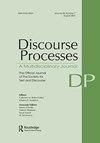阅读理解中的工作记忆、词汇广度和深度——对三年级学生的研究
IF 2.1
2区 心理学
Q2 PSYCHOLOGY, EDUCATIONAL
引用次数: 0
摘要
摘要在本研究中,我们以55名典型的8岁意大利儿童为样本,调查了词汇知识在工作记忆和阅读理解之间关系中的作用。WM在理解中的作用是公认的,因为两者都涉及成功执行任务的相似过程(即积极维护相关信息,同时抑制不相关的材料)。较少研究的是词汇知识的作用。在这里,我们考虑了广度(通过命名任务评估)和深度(通过相似性和词汇任务评估)。我们的数据表明,WM与阅读理解之间的密切关系是由词汇深度(而不是词汇广度)介导的。此外,我们还证明了反向关系,即WM和阅读理解占词汇深度(但不占广度)。这些发现对教育研究具有重要意义,并有助于有关阅读理解本质的文献。本文章由计算机程序翻译,如有差异,请以英文原文为准。
Working Memory, Vocabulary Breadth and Depth in Reading Comprehension: A Study with Third Graders
ABSTRACT In the current study, we investigated the role of vocabulary knowledge in the relation between working memory (WM) and reading comprehension, in a sample of 55 typically developing 8-year-old Italian children. The role of WM in comprehension is well-established, as both involve similar processes for successful task performance (i.e., active maintenance of relevant information, while inhibiting irrelevant material). Less investigated is the role of vocabulary knowledge. Here, we considered breadth, (assessed via a naming task) and depth (assessed via similarity and a vocabulary task). Our data showed the strong relation between WM and reading comprehension is mediated by vocabulary depth (but not vocabulary breadth). In addition, we also demonstrated the reverse relationship, that is WM and reading comprehension account for vocabulary depth (but not breadth). These findings have important implications for educational research and contribute to the literature on the nature of reading comprehension.
求助全文
通过发布文献求助,成功后即可免费获取论文全文。
去求助
来源期刊

Discourse Processes
Multiple-
CiteScore
4.30
自引率
4.50%
发文量
27
期刊介绍:
Discourse Processes is a multidisciplinary journal providing a forum for cross-fertilization of ideas from diverse disciplines sharing a common interest in discourse--prose comprehension and recall, dialogue analysis, text grammar construction, computer simulation of natural language, cross-cultural comparisons of communicative competence, or related topics. The problems posed by multisentence contexts and the methods required to investigate them, although not always unique to discourse, are sufficiently distinct so as to require an organized mode of scientific interaction made possible through the journal.
 求助内容:
求助内容: 应助结果提醒方式:
应助结果提醒方式:


